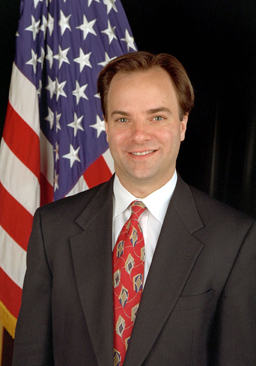
In the United States,Medicaid is a government program that provides health insurance for adults and children with limited income and resources. The program is partially funded and primarily managed by state governments,which also have wide latitude in determining eligibility and benefits,but the federal government sets baseline standards for state Medicaid programs and provides a significant portion of their funding.

The George Washington University is a private federally chartered research university in Washington,D.C. Chartered in 1821 by the United States Congress,GW is one of six universities in the United States with a congressional charter.

Mark Barr McClellan is the director of the Robert J Margolis Center for Health Policy and the Margolis Professor of Business,Medicine and Health Policy at Duke University. Formerly,he was a senior fellow and director of the Health Care Innovation and Value Initiative at the Engelberg Center for Health Care Reform at The Brookings Institution,in Washington,D.C. McClellan served as commissioner of the United States Food and Drug Administration under President George W. Bush from 2002 through 2004,and subsequently as administrator of the Centers for Medicare and Medicaid Services from 2004 through 2006.

The Children's Health Insurance Program (CHIP) –formerly known as the State Children's Health Insurance Program (SCHIP) –is a program administered by the United States Department of Health and Human Services that provides matching funds to states for health insurance to families with children. The program was designed to cover uninsured children in families with incomes that are modest but too high to qualify for Medicaid. The program was passed into law as part of the Balanced Budget Act of 1997,and the statutory authority for CHIP is under title XXI of the Social Security Act.
Families USA is a nonprofit,nonpartisan consumer health advocacy and policy organization.
Early and Periodic Screening,Diagnostic and Treatment (EPSDT) is the child health component of Medicaid. Federal statutes and regulations state that children under age 21 who are enrolled in Medicaid are entitled to EPSDT benefits and that States must cover a broad array of preventive and treatment services. Unlike private insurance,EPSDT is designed to address problems early,ameliorate conditions,and intervene as early as possible. For the 25 million children enrolled in Medicaid and entitled to EPSDT in 2012,the program is a vital source of coverage and a means to improve the health and well-being of beneficiaries.
Healthcare reform in the United States has a long history. Reforms have often been proposed but have rarely been accomplished. In 2010,landmark reform was passed through two federal statutes:the Patient Protection and Affordable Care Act (PPACA),signed March 23,2010,and the Health Care and Education Reconciliation Act of 2010,which amended the PPACA and became law on March 30,2010.
Medicaid estate recovery is a required process under United States federal law in which state governments adjust (settle) or recover the cost of care and services from the estates of those who received Medicaid benefits after they die. By law,states may not settle any payments until after the beneficiary's death. States are required to adjust or recover all costs under certain circumstances,all involving long-term care arrangements. Federal law also gives states the option to adjust or recover the costs of all payments to health care providers except Medicare cost-sharing for anyone on Medicaid over the age of 55.

The Milken Institute School of Public Health is the school of public health of the George Washington University,in Washington,DC. U.S. News &World Report University Rankings ranks the Milken SPH as the 11th best public health graduate program in the United States.

The Affordable Care Act (ACA),formally known as the Patient Protection and Affordable Care Act and colloquially known as Obamacare,is a landmark U.S. federal statute enacted by the 111th United States Congress and signed into law by President Barack Obama on March 23,2010. Together with the Health Care and Education Reconciliation Act of 2010 amendment,it represents the U.S. healthcare system's most significant regulatory overhaul and expansion of coverage since the enactment of Medicare and Medicaid in 1965.
The community health center (CHC) in the United States is the dominant model for providing integrated primary care and public health services for the low-income and uninsured,and represents one use of federal grant funding as part of the country's health care safety net. The health care safety net can be defined as a group of health centers,hospitals,and providers willing to provide services to the nation's uninsured and underserved population,thus ensuring that comprehensive care is available to all,regardless of income or insurance status. According to the U.S. Census Bureau,29 million people in the country were uninsured in 2015. Many more Americans lack adequate coverage or access to health care. These groups are sometimes called "underinsured". CHCs represent one method of accessing or receiving health and medical care for both underinsured and uninsured communities.
The Center for Medicare and Medicaid Innovation is an organization of the United States government under the Centers for Medicare and Medicaid Services (CMS). It was created by the Patient Protection and Affordable Care Act,the 2010 U.S. health care reform legislation. CMS provides healthcare coverage to more than 100 million Americans through Medicare,Medicaid,the Children’s Health Insurance Program (CHIP),and the Health Insurance Marketplace.

Leana Sheryle Wen is an American physician,author,professor,speaker,consultant,newspaper columnist and television commentator. She is former health commissioner for the city of Baltimore and former president of Planned Parenthood. She has written two books based on her experiences as a medical professional.
The Himmelfarb Health Sciences Library was completed in 1973 during the presidency of Lloyd Elliott. The library serves the George Washington University School of Medicine and Health Sciences,the Milken Institute School of Public Health,and the George Washington University School of Nursing. The building is part of the Ross Hall Medical Complex,and has three floors above ground and one below ground. The library was named after Paul Himmelfarb.
The George Washington University Medical Faculty Associates is a non-profit 501(c)3 physician group practice affiliated with the George Washington University. The MFA group practice is made up of academic clinical faculty of the GW Medical School. As of 2015,the group had more than 750 physicians providing medical services to the Washington DC,Northern Virginia,and Maryland areas. The GW Medical Faculty Associates offers over 51 specialty areas of care. The organization is a partner with the George Washington University Hospital and the School of Medicine and Health Sciences.

In the context of American public healthcare policy,the Medicaid coverage gap refers to uninsured people who do not qualify for marketplace assistance under the Affordable Care Act (ACA) and reside in states that have not adopted Medicaid expansion under the ACA. People within this categorization have incomes above the eligibility limits for Medicaid set by their state of residence but fall below the federal poverty line (FPL),resulting in deficient access to affordable health insurance. As of March 2023,an estimated 1.9 million Americans in 10 states are within the Medicaid coverage gap according to the Kaiser Family Foundation. Approximately 97 percent of this cohort lives in the Southern U.S.,with a majority living in Texas and Florida;Texas has the largest population of people in the cohort,accounting for 41 percent of people in the coverage gap.

Rebekah Elizabeth Gee is an American physician and public health policy expert who is Founder and CEO of Nest Health and served as the secretary of the Louisiana Department of Health from 2016 to 2020. As Secretary,Gee led the expansion of Medicaid. Prior to her role as secretary,Gee led a variety of quality improvement efforts at the state and national levels.
Helen L. Smits was a health policy influencer and advocate in the United States,and lent her voice to several healthcare initiatives abroad. Most notably,she was a recipient of the Fulbright scholarship and served under the Carter and Clinton administrations. She also held positions in government organizations including the National Institutes of Health (NIH) and Healthcare Financing Administration.
Elizabeth Fowler is an American lawyer who is Director of the Center for Medicare and Medicaid Innovation. She previously served under President Barack Obama at the National Economic Council. In 2022,she was included by Stat News on their list of leaders in the life sciences and she was elected a Member of the National Academy of Medicine.










